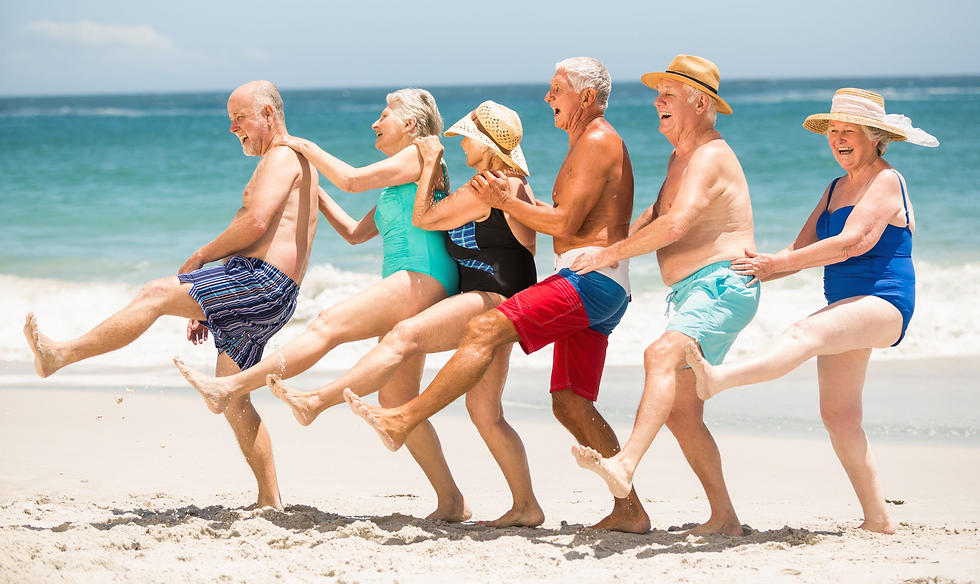
Active Aging Wellness
Powering Your Health

FAQ
I'm too old to start exercising : It is never too late to start execising. The benefits for fitness, health and mental well being are numerous and you should not worry how out of shape you are but what will happen if you don't exercise
Joint and bone concerns: Worry about putting too much stress on joints like knees and hips, and bones, potentially worsening existing issues. To exercise joints and bones, seniors should focus on weight-bearing exercises like walking, yoga, tai chi, and resistance training with weights or bands, which help maintain bone density and improve joint flexibility while minimizing strain on the joints and bones; incorporating balance training exercises is also crucial to prevent falls.
I Don't Think My Heart Can Take It: Doctors recommend you may tolerate shorter bursts of activity spread throughout the day. Aim for a goal of walking 30-45 minutes per day with rest intervals as needed; on most days of the week. Remember to cool down at the end of your exercise by gradually walking slower for the last three minute of your exercise.
I am Afraid of Hurting Myself Worry about performing exercises incorrectly and causing harm. While any exercise you has riskes, exercise done properly will not likely lead to injury and help you become stronger, mobile, flexible and healthy.
What’s the best way for seniors to build strength safely at home: It is never too late to start execising. The benefits for fitness, health and mental well being are numerous and you should not worry how out of shape you are but what will happen if you don't exercise
Can exercise really replace some medications: Worry about putting too much stress on joints like knees and hips, and bones, potentially worsening existing issues. To exercise joints and bones, seniors should focus on weight-bearing exercises like walking, yoga, tai chi, and resistance training with weights or bands, which help maintain bone density and improve joint flexibility while minimizing strain on the joints and bones; incorporating balance training exercises is also crucial to prevent falls.
Is creatine safe for adults over 65?: Doctors recommend you may tolerate shorter bursts of activity spread throughout the day. Aim for a goal of walking 30-45 minutes per day with rest intervals as needed; on most days of the week. Remember to cool down at the end of your exercise by gradually walking slower for the last three minute of your exercise.
I am Afraid of Hurting Myself Worry about performing exercises incorrectly and causing harm. While any exercise you has riskes, exercise done properly will not likely lead to injury and help you become stronger, mobile, flexible and healthy.
I Don't Have the Time: Everyone can find time to exercise. Even if it is 5 mins here and there. Execise is cumulative, so start 5 minutes here and there. Aiming for 30 minutes a day.
I'm Afraid I Will Fall: Many seniors worry about losing balance and falling during exercise, especially if they have mobility issues. Proper exercise programs will help you gain the strength, balance and confidence to greatly lessen falling incidents
Finding suitable activities: You can work with a personal trainer in identifying exercises that are appropriate for your fitness level and limitations. And have fun while doing so.
I Worry More About My Brain According to AARP, The number 1 exercise for the brain is aerobic exercise. Regular aerobic exercise boosts blood flow to your brain, and also boosts the size of your hippocampus, the part of your brain that's involved in verbal memory and learning. Cognitive exercises: Playing games such as jigsaw puzzles, sudoku, chess, and memory-stimulating games stimulates seniors' brains, enhancing cognitive function. Social exercises: Joining book clubs, participating in group classes, or spending time with friends and family fosters better social interactions for seniors.
Do seniors need extra protein compared to younger adults: Everyone can find time to exercise. Even if it is 5 mins here and there. Execise is cumulative, so start 5 minutes here and there. Aiming for 30 minutes a day.
How does hydration affect balance and fall risk: Many seniors worry about losing balance and falling during exercise, especially if they have mobility issues. Proper exercise programs will help you gain the strength, balance and confidence to greatly lessen falling incidents
Finding suitable activities: You can work with a personal trainer in identifying exercises that are appropriate for your fitness level and limitations. And have fun while doing so.
I Worry More About My Brain According to AARP, The number 1 exercise for the brain is aerobic exercise. Regular aerobic exercise boosts blood flow to your brain, and also boosts the size of your hippocampus, the part of your brain that's involved in verbal memory and learning. Cognitive exercises: Playing games such as jigsaw puzzles, sudoku, chess, and memory-stimulating games stimulates seniors' brains, enhancing cognitive function. Social exercises: Joining book clubs, participating in group classes, or spending time with friends and family fosters better social interactions for seniors.